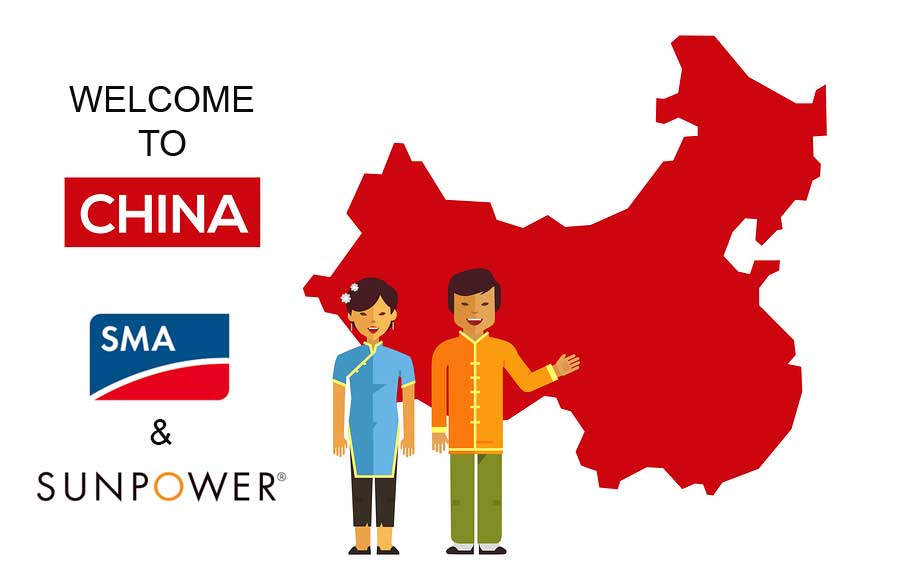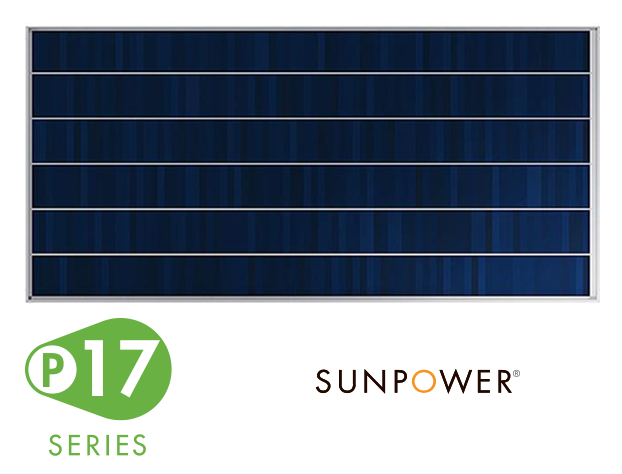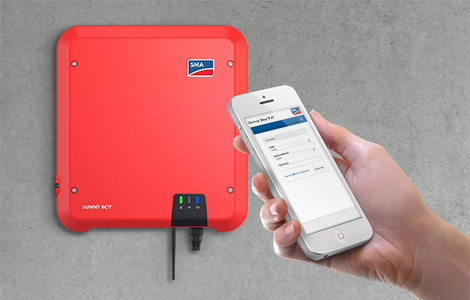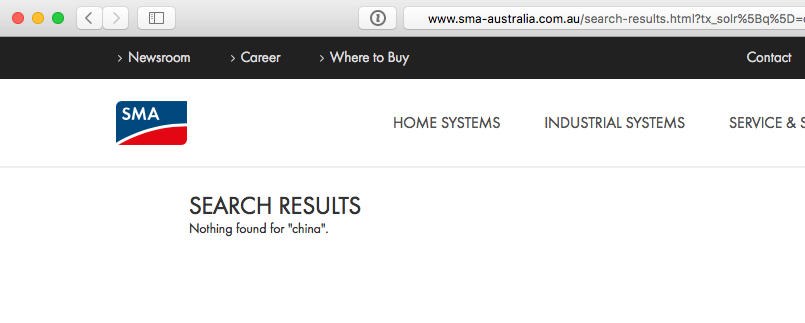
High end manufacturers SunPower And SMA have chosen to manufacture in China. But they aren’t exactly advertising the fact.
China produces far more solar panels, far more solar inverters, and god knows how many more batteries than any other country in existence. China has been called the workshop of the world1 and has repeatedly shown itself to be capable of producing high quality, reliable goods.
As examples, the majority of solar panels produced in China are tier one, which means major financial organizations trust them for use in large scale solar projects with an expected lifespan of 25 or more years. Some solar inverters manufactured in China are considered among the best in the world, and the lithium battery with the longest warranty I am aware of is made in China.
On the other hand, China also makes some absolute rubbish.
This rubbish includes solar panels that deteriorate in sunlight faster than a sparkly vampire and inverters that are about as reliable as a paper condom.
Chinese Products Are Better Than Their Reputation
Here in Australia, the prevailing wisdom seems to be that “made in China” means “this is crap”. This is despite the fact that Australians keep buying Chinese goods over and over again, which suggests either they aren’t all crap or that we are very slow learners.
For example, it beggars belief how many Australians skip right past the good Chinese Tier 1 brands and instead buy lower tier Chinese panels of questionable quality simply because because they have brand names that don’t sound Chinese such as ‘Australian Premium Solar’, ‘German Solar’, ‘Hanover Solar’ or ‘Munchen Solar’.
I can understand part of this reluctance to realistically appraise Chinese products. We are creatures of habit and like to pigeon hole things. But unless we take the effort to update our opinions every now and then we’ll end up reaching into a hole and instead of finding a pigeon we’ll pull out a whole mess of stupid that will get us into trouble.
But I think people will soon learn they have to look at the company and not the country to determine the quality of a product. Particularly now that high end solar companies such as SunPower and SMA have chosen to manufacture in China.
SunPower To Manufacture P Series Panels In China
SunPower has its headquarters in the United States, is owned by a French oil company, and has manufacturing capacity in Malaysia, the Phillipines, and Mexico. They are one of the oldest solar companies around, the quality of their panels is among the best in the world, and they have the highest efficiency of any panel on the market. Because of their panel’s reliability they offer a product warranty of 25 years, which is one of the best in world, but not the best.
Because of competition from companies selling less wonderful but much less expensive panels, SunPower is currently going through “restructuring”. This is a word they use to describe closing a factory in the Philippines and sacking a heap of people. Part of this restructuring involves moving into manufacturing in China in a big way.
If you want to build a factory in China it can definitely be a good idea to find a Chinese partner. It can even be required by law. Having been divorced more times than I’ve been married, I can tell you finding a good partner can be hard. But I’ll assume it was love at first sight when SunPower saw the Chinese large firm DEC.
Dongfang Electric Company, or DEC for short, as well as Tianjin Zhonghuan Semiconductor, or TZS, will be partnering up with SunPower to produce their P series panels. These have overlapping solar cells and lower efficiency than SunPower’s X series, but they do have the advantage they can be made with ordinary and therefore cheaper silicon wafers while still possessing the funky shade tolerance and 25 year product warranty that SunPower panels are known and loved for.

Sunpower P-Series. 25 Year Product Warranty. Soon to be made in China. Image: Sunpower
When the factory this hopefully happy partnership is planning to build is completed, it will have 21 solar panel production lines and be capable of producing 5 gigawatts of panels a year. That is enormous and if it existed now it would be the largest solar panel factory in the world by far. In 2016 SunPower only manged to produce around 1.65 gigawatts of panels in total.
SunPower Doesn’t Seem To Want You To Know About This
You may think SunPower would be pretty stoked about how they and their partners are going to build the world’s largest solar panel factory, which will allow them to quadruple their production capacity when complete. You might think they’d be boasting about it, but they’re not.
There’s no mention of it on their press release page and according to PV Magazine during their last quarterly earnings call they only made one vague reference to China.
It’s almost as if they are embarrassed by it. But that doesn’t seem right because the first rule of business (currently I have 63 first rules of business) is that the worse the deal you’ve been forced to make, the more you brag about what a great deal it was.
I suspect their actual motivation is they don’t want people to know they will manufacture in China. If this is the case it seems rather cowardly of them. Either it is a good idea to start manufacturing in China or it’s a bad idea. If it was a good idea then they should be prepared to explain why it is a good idea and how they will make top quality panels in China. If it was a bad idea then they shouldn’t have bloody well decided to do it in the first place.
But its still early days. Perhaps once SunPower’s Chinese production gets underway they will proudly inform everyone where the panels were made.
If they do, they will be quite different from Germany’s SMA, which apparently has been building inverters in China for a while now while bending over backwards to hide the fact.
Germany’s SMA Builds Inverters In China
SMA is a German company that is generally considered to be among the top two inverter manufacturers in the world in terms of quality and reliability. They have manufacturing capacity in both Germany and China.
SMA didn’t always used to manufacture in China. In fact, I found the following quote from the year 2012 by a person claiming to be an SMA representative:
“Please let me assure you that SMA inverters are manufactured in Germany. This is essential to ensure the high quality reputation of SMA. Under no circumstances do we manufacture in China.”
This is amusing because in 2012 SMA acquired Zeversolar, a Chinese inverter manufacturer in Jiangsu. But they didn’t use Zeversolar to produce SMA inverters. Instead SMA managed the company which produced inverters under the Zeversolar brand, which is probably one of the better lower cost inverters available.
But SMA inverters are now made in China. Currently SMA’s larger 3 phase inverters are German made, but their smaller single phase ones (AKA the Sunny Boys) are all now Chinese.

The Legendary SMA Sunny Boy Inverter. Now made in China (just like that iPhone). Image: SMA
Moving production to China was not a sudden move by SMA. They didn’t all get wasted on schnapps one lunchtime and mail the production line to Jiangsu in a drunken afternoon. They had 5 years experience making inverters in China under the Zeversolar brand, so it seems very likely they had the experience required to make the move a success.
This is exactly the sort of thing I would be telling people if I worked for SMA. But they don’t seem to want to mention the fact they are making inverters in China at all. Just like SunPower, there is no mention of it on their press release pages. In fact if you search their entire website for the word ‘China’ this is what you see:

China you say? No, nothing to see here…
Last month SMA published a blog post “Everything You Need to Know About the New Sunny Boy 3.0–5.0 Solar Inverter”. Finn tells me he left a comment saying “Everything except the fact that they are the first SMA inverters to be made in China?“.
SMA appear to have deleted Finn’s comment.
Dodging The Truth Makes Good Companies Look Bad
The reason companies feel the need to hide the fact they manufacture in China is obvious. Plenty of consumers consider the craptastic products produced by some Chinese companies to be representative of the production of the entire People’s Republic of China.
But companies trying to hide where they manufacture things isn’t going to work. These days we have this thing called the internet. It’s been around for a while and probably isn’t going to go away any time soon. People will use it to find out where products are made and crude and boorish internet pedants will mock dissembling companies with vigor.
Footnotes
- The United States has been called the arsenal of democracy. I can’t deny the US appears to have more than its fair share of arsenals. ↩

 RSS - Posts
RSS - Posts



Hi Ron – just on your footnote – and speaking of body parts (!) – its certainly not the heart of democracy (except perhaps for ‘haves’).
It’s still a sun power. Slow and unresponsive to network changes
Until I read this post I thought that China must be a town in Germany. Actualy though, the new SMA inverters clearly shown “Made in China” on the inverter label. That’s a strange way to hide the China connection!
I can remember when only some dill with an IQ the same as his hatsize would be seen dead with any form of Japcrap.
As you say: It’s the company/product (and particularly the warranty!) that matters. The country is irrelevant.
I, personally, have had a very good run with China-made products. MUCH cheaper prices and MUCH better warranty back-up/service has been a bonus.
Dear Sir,
Please let me know what is the Best Performance Solar Panel for Tropical counters ( For Sri Lanka)
Mono Crystalline or Multi Crystalline.
Please reply with information .
Hello. Per watt of capacity there is no significant difference between the output of monocrystalline solar panels and polycrystalline (multicrystalline) panels. Monocrystalline panels normally have higher efficiency, so they will take up less space than polycrystalline panels, but apart from this, in practice they are basically the same. The difference between different brands of panels are much more important than the differences between monocrystalline and polycrystalline panels.
In a hot humid environment like Sri Lanka, I would say it is important to have panels that are Potential Induced Degradation or PID resistant. Modern tier one panels are PID resistant, but others may not be.
Maybe the Trump factor is weighing heavily on Sunpowers ethical dilemma. Any American manufacturer who admits they make their products anywhere other than the good old us of a, but especially China and perhaps Mexico is going to feel some pain according to the “great” man.
Arsenals or arseholes? Seems that the USA is a great repository of both.
About Chinese made inverters,
What is your opinion on Chinese “top of the line” inverter manufacturers (i.e. Growatt, Solis, Huawei, Samil)?
I would class Growatt, Samil as bottom of the line Chinese inverters. I would not recommend them.
Huawei – are new entrants – the only ones approved for sale in Oz are their 8-33kW inverters. I have no experience of them.
Solis – I think are OK mid range inverters.
If you want a budget Chinese inverter I’d be looking at Sungrow or Zeversolar, preferably Sungrow.
American sheep are fond of dismissing the modus operandi of the elite class (and their big businesses) as “conspiracy theories”.
One common “conspiracy theory” is hiding where things come from, whether it’s solar products or fertilizer. We have a lot of “distributed by” labels that don’t tell people their food was farmed next to a lead smelting plant in China.
It’s not just the quality of products that matter, either, but their environmental impact. A country that enables the production of garbage products shouldn’t be treated as if it’s suddenly a “tier 1” country because a subset of its products are decent quality. People who do business with China are propping up that corruption.
That is truth. China makes 99% low end they get a quality company to come there and now they are tier 1. Ask Tawain about China
Hi Finn,
‘Solis – I think are OK mid range inverters.’
As an update with ever changing companies – how would you rate Solis and Goodwe inverters..
Hi Richard, Ronald here.
Reliability data for inverters is hard to come across. What we can do is keep an ear out and see if installers have problems with a particular brand or if has poor customer service if their inverter does have a problem. This is not objective and so it is often difficult to say if one inverter is better than another of roughly the same price point. What I do know about Goodwe is it’s a low cost budget inverter. It may be good value for money but I would not expect it to be as reliable as a higher end brand. Some people will be happy with saving money up front while others will prefer to pay more for greater reliability.
Goodwe are budget inverters. I’d personally be looking to Sungrow if I were after a budget inverter.
Solis – mid-range, but still fairly low volume from what I’ve seen. The bigger manufacturers would be my choice.
https://www.solarquotes.com.au/solar101.html#inverterchart
Thank you for the honest observations and responses.
More than half of our USA voting humans did vote for a less worst option. Again, due to failures to recognize the despicable dishonesty of the repubnik fraternity boys, the worst option was placed in a position of power. Hints of 1930’s Germany and Italy?
So, thank you.
Can anyone tell me where Sunpower X21 series panels are actually assembled?
Where are Sunpower x20-327-D-AC panel manufactured?
Well said. I have been digging in the off grid field and some responses are surprising.
I would not, now, buy any SunPower solar product regardless of quality reports since they have decided to manufacture in China. Do they intend to abandon the manufacturing base in Malaysia?
China’s human rights record is not great; they have trampled the civil rights of the people of Hong Kong; they have constructed military bases on three Atolls in the South China Sea complete with missile launchers and have threatened commercial airliners in international air space. They invaded Tibet and trampled the civil rights of Tibetans. They make the same sort of claims on Taiwan as Putin has made over the Ukraine and are just as likely to pursue a similar course of Action.
I’m tired of seeing all the Household Products in Asda, Morrison’s, Sainsbury’s & Tesco proudly displaying a‘Made in China’ label and offering minimal alternative countries of origin on the shelves. Although SunPower is registered in the US it is owned by a French Oil Company TotalEnergies which has a complex history of negative environmental and social impacts on the communities in which it operates, including multiple controversies.